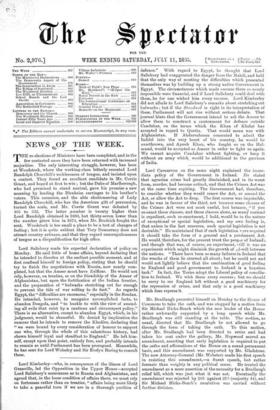Mr. Bradlaugh presented himself on Monday to the House of
Commons to take the oath, and was stopped by a motion from Sir Michael Hicks-Beach which the new leader of the House rather awkwardly supported by a long speech while Mr. Bradlaugh was still standing at the table. The motion, as usual, directed that Mr. Bradlaugh be not allowed to go through the form of taking the oath. To this motion, after Mr. Bradlaugh had been directed to retire and had taken his seat under the gallery, Mr. Hopwood moved an amendment, asserting that early legislation is required to put the oaths and affirmations of the House on a sound permanent basis, and this amendment was supported by Mr. Gladstone. The new Attorney-General (Mr. Webster) made his first speech in resisting this amendment,—a fluent speech, but rather forensic than weighty in any political sense. He treated the amendment as a mere assertion of the necessity for a Bradlaugh relief bill, which was just what it was not. Eventually the amendment was rejected by 263 against 219 (majority 44), and Sir Michael Hicks-Beach's resolution was carried without further division.


































